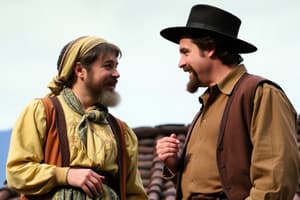Podcast
Questions and Answers
Who worries about when he will be home?
Who worries about when he will be home?
Papa
What does HODEL hope Yente has found for Tzeitel?
What does HODEL hope Yente has found for Tzeitel?
A good match
What does GOLDE say about a poor girl without a dowry?
What does GOLDE say about a poor girl without a dowry?
She can't be so particular
What does Motel tell Tzeitel he plans to buy?
What does Motel tell Tzeitel he plans to buy?
Motel believes that Tzeitel's father will be impressed with him after he buys a sewing machine.
Motel believes that Tzeitel's father will be impressed with him after he buys a sewing machine.
What does TEVYE insist about agreement?
What does TEVYE insist about agreement?
Who did Yente say was seen with Chava?
Who did Yente say was seen with Chava?
Tzeitel is happy about the match her father has arranged for her.
Tzeitel is happy about the match her father has arranged for her.
What does GOLDE ask about when she sees Motel?
What does GOLDE ask about when she sees Motel?
Match the following characters with their roles:
Match the following characters with their roles:
Flashcards are hidden until you start studying
Study Notes
Characters and Relationships
- Golde: Tzeitel's mother, expresses traditional views on marriage and dowries.
- Tzeitel: Golde's oldest daughter, caught between familial duty and personal desire.
- Motel: A poor tailor in love with Tzeitel; symbolizes hope for love transcending financial status.
- Yente: The matchmaker, embodies the pressure of societal and familial expectations for marriage.
- Tevye: Tzeitel’s father, represents authority and tradition within the family, often conflicted between customs and his daughters' happiness.
Themes
- Tradition vs. Change: The conflict between adhering to traditional matchings and the desire for personal choice in marriage.
- Women’s Agency: Tzeitel's resistance to an arranged marriage illustrates a struggle for autonomy within a patriarchal society.
- Family Expectations: The pressure exerted on daughters to marry well reflects societal norms of the time.
Key Moments and Quotes
- Golde’s Protective Nature: "You want hair? Marry a monkey." - Highlights the desperation of Tzeitel’s situation and her mother's pragmatic approach.
- Tzeitel’s Defiance: “I can’t marry him...I’ll be unhappy all my days.” - Represents the turning point where she prioritizes personal happiness over tradition.
- Marriage Bargains: "With us, an agreement is an agreement." – Tevye emphasizes the weight of familial promises that bind the daughters.
Societal Commentary
- The dialogue highlights the rigid class distinctions and pressures on women to conform to societal norms regarding marriage.
- The role of a matchmaker, like Yente, illustrates how relationships were often transactional rather than romantic during this period.
Emotional Dynamics
- Tzeitel's emotional plight is palpable as she navigates love, obligation, and societal expectations, showcasing the tension between duty to family and personal desires.
- Motel’s humble yet earnest character provides a contrast to the wealth-focused suitor, emphasizing love over material conditions.
Important Conflicts
- Tevye vs. Tzeitel: Represents the generational clash between traditional authority and modern romantic aspirations.
- Tzeitel’s Internal Conflict: Her desire for autonomy versus familial loyalty creates dramatic tension throughout the narrative.
Resolutions
- Tzeitel's eventual agreement to marry Motel reveals personal sacrifice for love, symbolizing a compromise between tradition and modernity.
- The juxtaposition of Tzeitel’s initial fears and final resolution indicates a gradual shift toward greater female empowerment within the constraints of tradition.
Studying That Suits You
Use AI to generate personalized quizzes and flashcards to suit your learning preferences.




